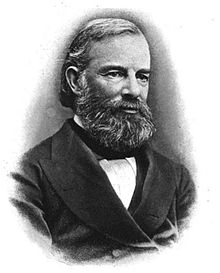
Samuel Longfellow

Samuel Longfellow | |
|---|---|
 | |
| Born | June 18, 1819 |
| Died | October 3, 1892 (aged 73) Cape Elizabeth, Maine, United States |
| Resting place | Western Cemetery, Portland, Maine, United States |
| Nationality | American |
| Education | Bowdoin College, Harvard Divinity School |
| Occupation(s) | Clergyman and hymn writer |
| Parents |
|
| Relatives | Henry Wadsworth Longfellow (brother) |
| Signature | |
Samuel Longfellow (June 18, 1819 – October 3, 1892) was an American clergyman and hymn writer.

Biography
Samuel Longfellow was born June 18, 1819, in Portland, Maine, the last of eight children of Stephen and Zilpah (Wadsworth) Longfellow.[1] His older brother was the poet Henry Wadsworth Longfellow. He studied at Bowdoin College in 1833.[2] He attended Portland Academy and then Harvard College, where he graduated in 1839 ranked eighth in a class of 61.[3] He went on to study at Harvard Divinity School, where his classmates included Thomas Wentworth Higginson and Samuel Johnson, with whom he would later collaborate in his hymn writing.

He is considered part of the second-generation of transcendentalists;[4] after becoming a Unitarian pastor, he adapted the transcendental philosophy he had encountered in divinity school into his hymns and sermons.

Longfellow served as a gym leader in Fall River, Massachusetts (1848), Brooklyn's Second Unitarian Church (1853), and Germantown, Pennsylvania (1878-1882). After his older brother's death, Longfellow published a two-volume biography of him in 1886.[5] He wrote the book while living at his brother's former home, Craigie House in Cambridge, Massachusetts.[6] In 1878, Longfellow was elected as a member to the American Philosophical Society.[7]

His other publications include Final Memories of H. W. Longfellow (1887), Vespers (1859), A Book of Hymns and Tunes (1860, revised 1876) and, with Samuel Johnson, he edited A Book of Hymns for Public and Private Devotion (1846) and Hymns of the Spirit (1864).[6] Longfellow died in 1892 and is buried in Western Cemetery in Portland's West End.

Longfellow was an abolitionist, pacifist, and supporter of women’s rights.[8]

Personal life
Throughout his life Longfellow had romantic friendships with men, and struggled with his sexuality, writing in 1837 of one such companion, William Winter: "I don’t think I have made a greater sacrifice of inclination to a sense of duty - but not a hearty one - I was reluctant then; I have been sorry at times ever since. It was a strange infatuation. And yet after all my fears might we not have been happy together? I loved him, and think he liked me."[8] In 1842 he met fellow Divinity student Samuel Johnson: of their long association, a friend wrote: "There existed for forty years an intimacy which could hardly have been understood by David and Jonathan.”[9] Longfellow later served a friend and mentor to young men such as Morton Fullerton.[10]

Selected bibliography
- A Book of Hymns for Public and Private Devotion, 1846, edited with Samuel Johnson. The collection was enlarged and revised in 1860.
- Thalatta: a Book for the Seaside, with Thomas W. Higginson, 1853
- Vespers, 1859
- The Poem of Niagata, 1861
- Hymns of the Spirit, 1864 (jointly edited with Samuel Johnson)
- The Life of Henry Wadsworth Longfellow, 1886
- Memoir and Letters, 1894
References
- ^ Abdo 2008, p. 24.
- ^ General Catalogue of Bowdoin College 1794-1950, page 76
- ^ Abdo 2008, p. 56.
- ^ Gura, Philip F. American Transcendentalism: A History. New York: Hill and Wang, 2007: 8. ISBN 0-8090-3477-8
- ^ Wayne, Tiffany. Encyclopedia of Transcendentalism. New York: Facts on File, 2006: 169. ISBN 978-0-8160-5626-2
- ^ a b McKim 1993, p. 228.
- ^ "APS Member History". search.amphilsoc.org. Retrieved May 12, 2021.
- ^ a b ""A Sacrifice of Inclination": Samuel Longfellow". www.nps.gov. U.S. National Park Service.
- ^ Edward Everett Hale, Five Prophets of Today, Boston, 1892, p50.
- ^ "William Morton Fullerton to Walt Whitman, 1 August 1887 (Correspondence) - the Walt Whitman Archive".
Sources
- Abdo, Joseph C. (2008). The Quiet Radical: The Biography of Samuel Longfellow. Lisbon, Portugal: Tenth Island Editions. ISBN 978-972-99858-2-9.
- McKim, LindaJo H. (1993). The Presbyterian Hymnal Companion. Louisville, Kentucky: Westminster/John Knox Press. ISBN 0-664-25180-3.
External links
- Works by Samuel Longfellow at Project Gutenberg
- Works by or about Samuel Longfellow at the Internet Archive
- http://www.hymntime.com/tch/bio/l/o/n/longfellow_s.htm
- https://web.archive.org/web/20080724033609/http://www.alcott.net/alcott/home/champions/Longfellow.html
- http://www.encyclopedia.com/doc/1E1-E-LongfellS.html
- American Unitarian clergy
- Harvard Divinity School alumni
- 1819 births
- 1892 deaths
- American Christian hymnwriters
- 19th-century American Christian clergy
- Writers from Portland, Maine
- People from Cape Elizabeth, Maine
- Burials at Western Cemetery (Portland, Maine)
- Harvard College alumni
- 19th-century American clergy
- Henry Wadsworth Longfellow
- Christian abolitionists
- LGBTQ Protestant clergy
See what we do next...
OR
By submitting your email or phone number, you're giving mschf permission to send you email and/or recurring marketing texts. Data rates may apply. Text stop to cancel, help for help.
Success: You're subscribed now !
